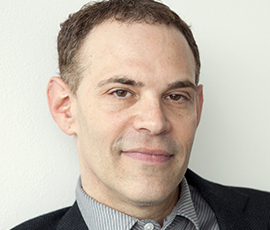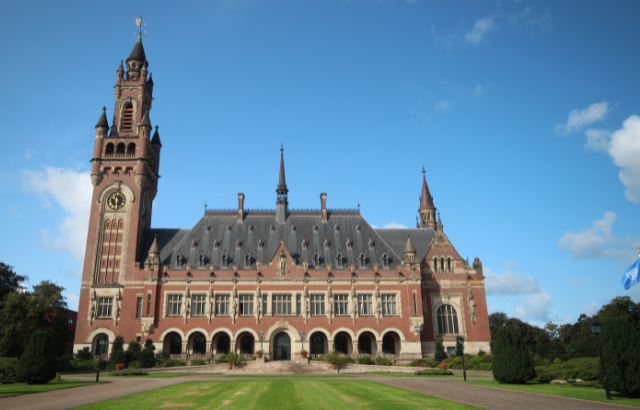Rights against democracy - recalling International Human Rights Day
The 10 December is International Human Rights Day, an event first celebrated 65 years ago. In this blog post, Professor of Law, Eric Heinze gives an insightful look into how human 'rights' have progressed over the centuries.

Eric Heinze, Professor of Law
Human ‘rights’ have emerged progressively, over centuries. They have transformed millennia of thinking about politics, culture and law. They paint a portrait of individuals as, by nature, equal holders of inalienable rights. (Many protagonists have countered with notions of group rights, but those remain controversial in theory and practice.)
Karl Marx postulated individual rights—paradoxically, it might seem—as necessary, yet transient. The paradox disappears when we grasp Marx’s view of rights not as human essences but as historical products. Rights, he argued, had been necessary for that phase of history in which humans needed to shake off their de-humanised conditions of servitude, as embodied in feudalism.
The model for such overthrow was the French Revolution, with its 1789 Declaration of the Rights of Man and the Citizen. That ‘bourgeois’ revolution replaced the individual-as-vassal with a new model of the individual-as-citizen, guaranteed by charters of rights, which abide with us still today. For Marx, that politics, with the individual as fulcrum, remained inadequate. It had only replaced one exploitative regime with another. Paramount to classical human rights were rights of private property. In the 19th century, courts often enforced property rights as quasi-absolute, which facilitated gaping disparities of wealth.
For Marx, the only individuals profiting from human rights were members of the small, privileged bourgeoisie. Universal rights became the supreme justification for capitalist societies. But such societies, he claimed, could never universalise rights in any effective sense. Hence Marx’s view that the era of human rights—of protections universally promised but, he believed, never delivered—would, in turn, have to be overthrown by socialist revolutions, which would guide humanity towards a classless future. Human welfare would no longer require the mediation of divisive, individualist, litigious mechanisms of ‘rights’. Prosperity would surface through communal human endeavours.
With advancing capitalism, growing middle classes, and then the collapse of Soviet-style socialism came a globally revived rights consciousness. Some critics still condemn human rights as ideological tools of a neo-liberal world order. They reject universal rights as imperial constructs, part of a longstanding colonial enterprise serving to extirpate the world’s endless diversity of cultures and histories by disseminating one overarching pattern of human norms. Contrary to Francis Fukuyama’s 1992 ‘End of History’ theory, it may be that the great showdown of rights-as-essential versus rights-as-historical is yet to be played out.
Even mainstream, liberal advocates of human rights often concede that regimes of rights offer clumsy vehicles for pursuing justice. Activists working in crisis situations flee the ideological bickering altogether. They reach not for elegant political models, but for workable remedies for violations.
For as long as human rights remain with us, a further challenge nonetheless arises. Rights frameworks today pervade all of life. Every social problem ends up steeped in rights-based procedures. A habit then arises of viewing all of democracy as a sheer vehicle for managing rights. If one feels satisfied with one’s rights, one then feels satisfied with democracy.
Prevailing canons and charters do in fact include ‘democratic’ rights, including rights to speak, to vote, and otherwise to take part in political life. That status, however, merely leaves those prerogatives as so many items on a long checklist of rights, as if democracy is no more important than lots of other things.
My question is not whether rights to speak or to vote are ‘more important’ than, say, protections from torture or guarantees of a fair trial—as if each human right were a quantity that could be measured and compared with the others. The point is that citizens’ democratic prerogatives remain qualitatively different. There are many ways for a government to demonstrate its legitimacy: not torturing, not arbitrarily killing and imprisoning, etc. A state does not strictly need to be democratic to claim those forms of legitimacy. There is only one kind of right, however, by which a state claims legitimacy as a democracy, namely a right of political participation, embodied through broad-based public deliberation, and including the vote.
Once we have tossed that kind of right into the salad with a host of others, democracy itself becomes just one social good among many. Given, moreover, our legislators’ and judges’ views that rights need always to be ‘balanced’, core democratic prerogatives, including freedoms of speech, readily become balanced away, in the name of rights and democracy. The freedom to speak or to vote becomes scarcely different from the freedom to shop or to play Tomb Raider. Rights may be sold to us as a floor, but they turn into a ceiling. Or, to switch metaphors, rights furnish not springboards from which we jump into the rough-and-tumble of open political life. They instead promise a cozy refuge from controversy, from politics, from life, from democracy. Rights become democracy’s Victorian tea salon.
I do not necessarily seek to oppose rights. They are often desperately needed. Nor am I arguing that issues be withdrawn willy-nilly from the ambit of rights and subjected to outright majority rule. Majorities have sometimes done horrendous things.
Democracy, however, is never ‘finally’ achieved. It must constantly be renewed. When politics degenerates into mere fights for rights, the gift of human rights risks hollowing out any arena in which citizens might strengthen a publicly democratic society. Rights, long ago conceived as great friends of democracy, forever run the risk of eviscerating it.
Eric Heinze, Professor of Law & Humanities, Queen Mary University of London
Related items

10 December 2024

10 December 2024
